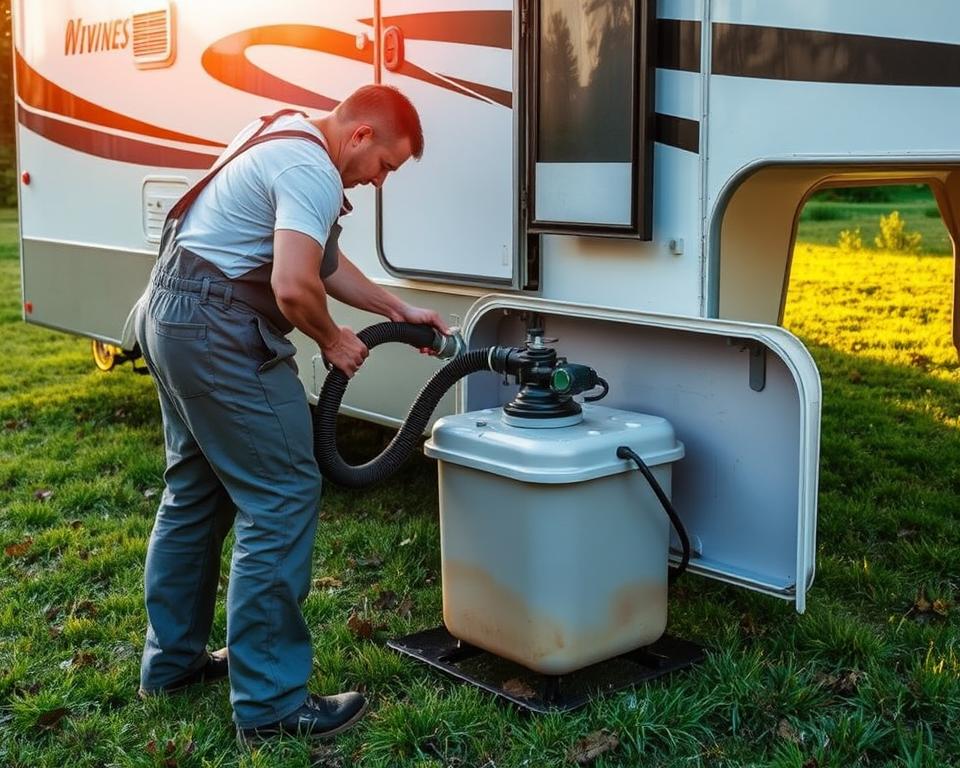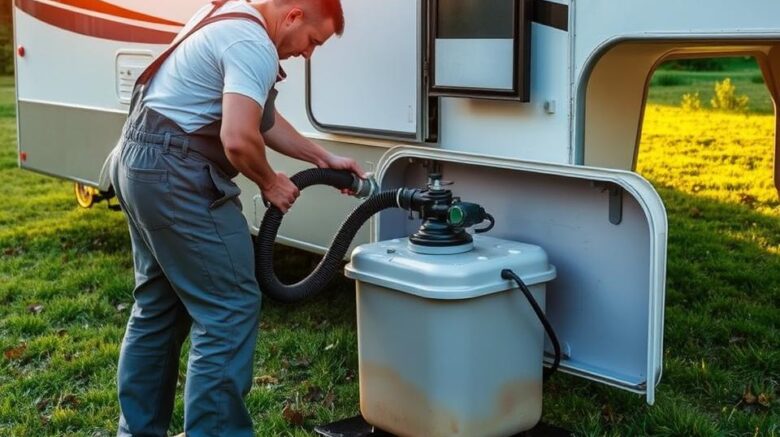Motorhome Tank Emptying: Your Overview to Easy Dumping
Have you ever pondered how your camper handles sewage while enjoying the wilderness? Septic servicing matters greatly, often more than you think. Ensuring your rig’s sanitation system functions properly is essential for trouble-free trips. In this overview, we cover RV sewage setups, the need for septic pumping, and best practices for carefree adventures. With All in Sanitation’s expertise in RV water tank and pump, your trips can be as splendid as your destinations.
Significant Notes
- Understanding RV waste systems is crucial for efficient RV septic pumping.
- Frequent pumping stops unwanted odors and clogs while traveling.
- Best practices can extend the life of your RV’s plumbing system.
- All in Sanitation provides reliable recreational vehicle septic services.
- Monitoring tank levels guarantees a smooth RV adventure.
- Eco-friendly dumping practices reflect good RV stewardship.
Comprehending RV Sewage Infrastructure
On-the-go waste setups in RVs play a vital role in sanitation. These systems typically comprise black and gray water storage. Black water tanks handle sewage from the bathroom. Meanwhile, gray tanks deal with wastewater from sinks and showers. Understanding how each tank works enhances your disposal process.
Proper upkeep of these components is crucial. Failing to pump the camper tanks regularly can cause clogs. This could spoil your camping trips. Ensure regular checks to keep both tank types functioning well.
Relying on a reputable black water provider ensures correct dumping. Specialized RV treatments extend tank longevity and prevent odors. Proper care of your waste system boosts your RV experience significantly.
The Importance of RV Tank Emptying
Routine septic service ensures a clean and efficient RV. Neglecting wastewater management leads to foul smells, blockages, and system breakdowns. Accumulated waste poses health risks from bacteria. Thus, ongoing upkeep is indispensable.
Choosing All in Sanitation guarantees green, compliant dumping. Their expertise guarantees safe, efficient handling of your waste. Regular septic system care prolongs your travel joys without waste concerns. It ensures your road trips remain enjoyable, avoiding the dangers of overlooked RV septic pumping.
When to Empty Your RV Tanks
How often you empty tanks influences your RV’s sanitation. Regular timing avoids travel interruptions. Your pumping schedule depends on occupancy, tank capacity, and usage patterns.
If you camp sporadically, consider emptying black water tanks every few days. Full-time RV dwellers might need to pump more often due to more waste. Monitoring tank levels closely can improve your maintenance routine significantly.
Chemical treatments are useful for determining when to pump. By adhering to these disposal recommendations, RV owners can effectively safeguard their systems. Preventing tanks from overflowing not only keeps your environment clean but also prolongs the plumbing lifespan of your RV.

RV Waste Emptying Techniques
Several effective methods exist for RV septic pumping, catering to different preferences. A macerator pump grinds waste into slurry creating a slurry for easier disposal. It enables smooth transfers to dump points. Many choose it for its speed and simplicity.
Home septic dumping allows for emptying the RV’s holding tank directly into a residential septic system. Check local rules to ensure lawful dumping. Properly executed, it’s eco-friendly and compliant.
Gravity-fed dumping relies on height difference to empty tanks. All dumping options have advantages and drawbacks. By understanding these, RV owners can select the most suitable option for their needs, ensuring effective waste management.
Essential RV Dumping Gear
Proper equipment makes tank emptying easier. A top-notch sewer hose is vital for connecting your RV’s waste tank to the dump station. It must be both durable and flexible for easy maneuvering. A good sewer hose simplifies waste disposal, making it less of a hassle.
Include a macerator pump in your gear list. They convert solids into liquid for easier dumping. They’re particularly useful where gravity can’t aid the emptying process.
Keep your waste tools in top condition. Always clean hoses and tools post-use to avoid contamination. Proper storage guarantees readiness. Well-maintained gear ensures clean and smooth emptying.
Top Tips for RV Sewer Maintenance
Maintaining a clean and efficient RV waste system is crucial for a pleasant travel experience. Adhere to these tips for spotless sanitation. First empty black water, then use gray water to flush. Gray water flushes residual solids, keeping lines clear.
It’s essential to use bacteria and enzyme treatments for effective wastewater management. They maintain a balanced microbial ecosystem in your tanks. Stay away from harsh chemicals as they can kill the beneficial bacteria, reducing the system’s effectiveness.
Regular rinsing prevents odor and debris buildup. Employing a dedicated sewer hose for black water use is a wise choice. It minimizes contamination risks and aids in maintaining system cleanliness.
Follow this routine to streamline sewer cleaning:
- Empty black tanks before gray.
- Incorporate bio-additives often.
- Steer clear of caustic cleaners.
- Clean equipment thoroughly each time.
- Inspect the system regularly for leaks or issues.
Following these steps, RV owners can improve the life span and functionality of their wastewater systems. This leads to more enjoyable road trip experiences.
Mobile Home Septic Maintenance
Similar to RVs, mobile homes need regular septic care for lasting performance. Timely maintenance helps avoid costly fixes and downtime. A routine pump every 3–5 years suits most setups, based on usage and capacity.
Proper dumping techniques protect your septic infrastructure. Only introduce safe, approved substances into the system. Biodegradable solutions and level monitoring minimize harm. Steer clear of damaging cleaners that kill beneficial bacteria.
Arrange periodic expert check-ups to spot issues before they escalate. Proactive inspections maintain seamless functionality. Adhering to these maintenance tips will ensure the septic system of your mobile home remains in excellent condition.
RV Trailer Sewage Handling Guidelines
Effective trailer wastewater disposal is essential for a smooth RV experience. Start by finding designated dump stations on your route. Verify legal compliance to prevent penalties and eco-harm. Using camper-safe solutions boosts tank health and dumping ease.
Flushing with clean water helps clear tanks completely. A thorough rinse eliminates leftover sludge. Residual waste leads to smells and clogs. Moreover, it supports an eco-friendly disposal method.
Advance planning is vital. By organizing your stops at disposal stations as per your travel plans, you can reduce hassle. This organization aids in streamlining the camper tank pumping process. Some useful tips for waste disposal include:
- Keep tabs on gauges to predict emptying times.
- Apply enzyme or bacteria-based solutions to decompose waste and boost tank performance.
- Always wear gloves and clean hands post-drainage gear handling.
RV Tank Additives Explained
Efficient waste management in motorhomes relies heavily on proper RV holding tank treatment. Formulations contain targeted microbes and enzymes. Designed to decompose solids efficiently. Consistent use curbs odors and keeps flow unobstructed.
Adding bio-treatments fosters a healthy septic ecosystem. Speeding up breakdown reduces tank buildup. Less frequent emptying prolongs service intervals.
Choose additives suited to your rig’s specs. Treatment options range widely. Eco-friendly options that work well with home septic systems are best. These choices maximize disposal efficiency and system health.
| Treatment Form | Key Components | Benefits |
|---|---|---|
| Liquid Formulas | Bio-catalysts | User-friendly; powerful decomposition |
| Powdered Solutions | Enzymes | Cost-effective; long shelf life |
| Tablet Treatments | Compressed bacteria | Convenient; pre-measured dosages |
Common Mistakes to Avoid During Pumping
Campers often stumble on simple dumping mistakes. A frequent oversight is not adhering to a routine pumping schedule. This leads to a quickly filling tank and subsequent issues. Additionally, the incorrect use of chemicals can damage the septic system. Leading to costly fixes and downtime.
Dumping tanks out of sequence is a typical error. The sequence is crucial, especially for black water service. Reversing the order invites leaks and smells. Avoid manual access to septic lids without professional help. This task should be left to professionals due to the inherent safety risks.
Moreover, neglecting equipment maintenance can cause leaks or clogs. Properly maintaining hoses and other essentials ensures an efficient and sanitary RV sewer cleaning process. Awareness of these potential errors can streamline waste management. And keeps campsites fresh and hygienic.
The Bottom Line
An in-depth guide on RV septic pumping is vital for RV or mobile home owners. They pave the way for hassle-free travels. Consistent care and system knowledge boost your adventure quality. Employing correct methods and gear ensures stress-free camping.
Choosing All in Sanitation for septic services grants tranquility. Their skilled team manages waste with precision and care. Thus, you can immerse yourself in the joy of your travels and craft unforgettable moments.
Routine tank emptying is fundamental to conscientious camping. It merges adventure with an odor-free, clean campsite. Ensuring every road trip remains clean and enjoyable.
